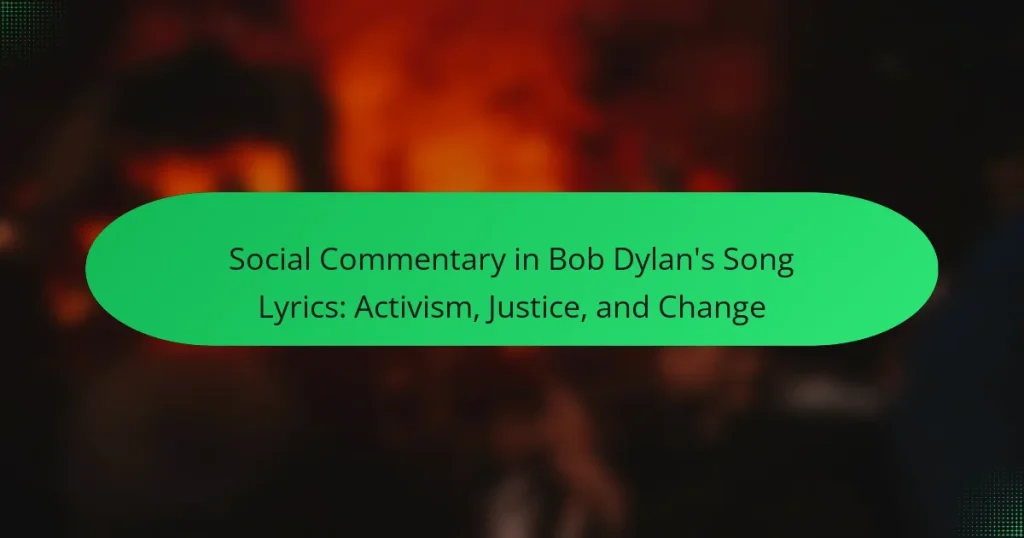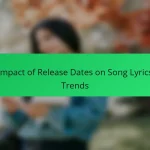Bob Dylan’s song lyrics serve as a significant form of social commentary, addressing critical social issues such as civil rights, war, and economic inequality. His use of metaphor and vivid imagery enhances the impact of his messages, making songs like “The Times They Are a-Changin'” and “Blowin’ in the Wind” powerful anthems for activism and societal change. Dylan’s work reflects the cultural upheaval of the 1960s and continues to resonate in discussions around justice and activism today. His lyrics not only critique political systems but also inspire collective action and shape cultural narratives surrounding social justice.
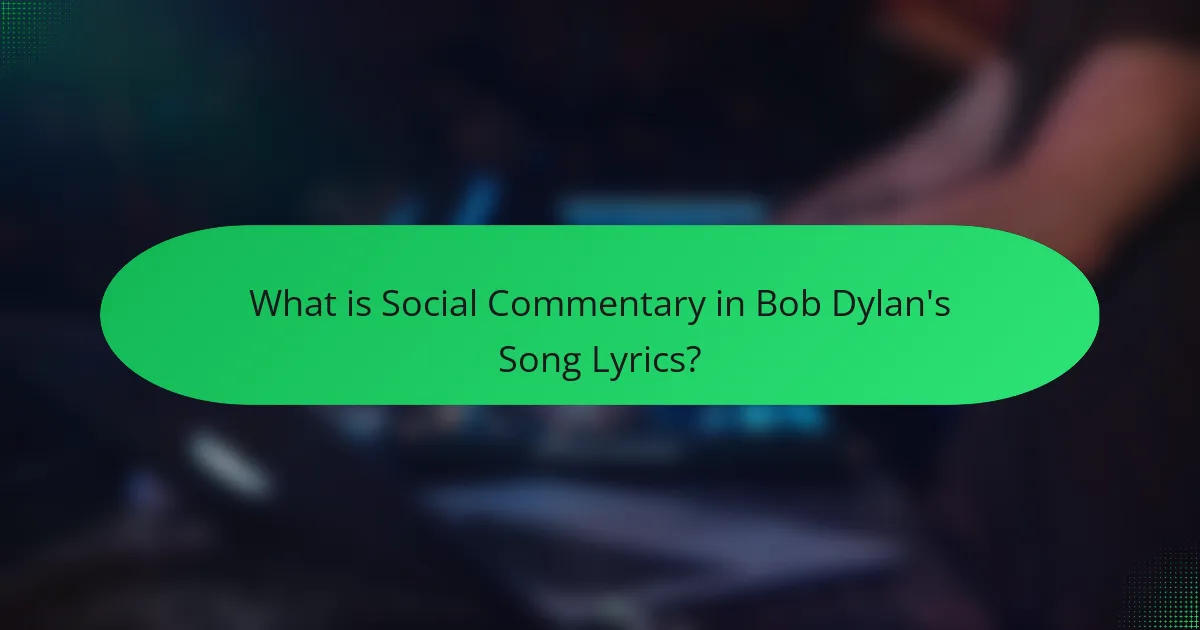
What is Social Commentary in Bob Dylan’s Song Lyrics?
Social commentary in Bob Dylan’s song lyrics refers to the critique of social issues and injustices. His lyrics often address topics like civil rights, war, and inequality. Dylan uses metaphor and vivid imagery to convey his messages. Songs like “The Times They Are a-Changin'” reflect societal shifts and calls for change. His work became anthems for social movements in the 1960s. Dylan’s lyrics challenge listeners to reflect on their beliefs and actions. This approach has solidified his role as a voice for activism and justice in music history.
How does Bob Dylan use lyrics to convey activism?
Bob Dylan uses lyrics to convey activism by addressing social and political issues directly. His songs often highlight themes of injustice, inequality, and war. For example, “The Times They Are A-Changin'” calls for social change and encourages activism. Dylan’s lyrics serve as a rallying cry for civil rights and anti-war movements. In “Blowin’ in the Wind,” he poses rhetorical questions about peace and freedom. This method prompts listeners to reflect on societal issues. His work became anthems for various movements in the 1960s. Dylan’s ability to blend poetic imagery with strong messages amplifies the impact of his activism.
What themes of justice are prevalent in Dylan’s songs?
Bob Dylan’s songs often explore themes of social justice, civil rights, and anti-war sentiments. His lyrics reflect the struggles against inequality and oppression. For example, “The Times They Are A-Changin'” serves as an anthem for social change. It calls for awareness and action against societal injustices. Another prominent song, “Hurricane,” tells the story of Rubin Carter, a wrongfully convicted boxer. This song highlights racial discrimination within the justice system. Dylan’s work frequently critiques authority and advocates for the marginalized. His music resonates with movements for justice and equality throughout history.
How do Dylan’s lyrics reflect societal change?
Dylan’s lyrics reflect societal change by addressing social injustices and political movements. His song “The Times They Are a-Changin'” became an anthem for the 1960s civil rights movement. The lyrics urge listeners to recognize and adapt to shifting societal norms. Additionally, songs like “Blowin’ in the Wind” pose rhetorical questions about peace and freedom. These questions resonate with the struggles of marginalized communities. Dylan’s work often critiques government policies and war, notably in “Masters of War.” His ability to capture the zeitgeist of his time makes his lyrics timeless. Through vivid imagery and poignant messages, Dylan articulates the hopes and frustrations of a generation.
Why is Bob Dylan considered a voice of a generation?
Bob Dylan is considered a voice of a generation due to his profound influence on music and culture during the 1960s. His lyrics addressed social issues such as civil rights, war, and inequality. Songs like “Blowin’ in the Wind” and “The Times They Are a-Changin'” became anthems for social movements. Dylan’s ability to capture the spirit of the times resonated with a wide audience. He articulated the frustrations and hopes of young people seeking change. His music inspired activism and encouraged political engagement. Dylan’s unique blend of folk, rock, and poetic lyricism set him apart from his contemporaries. His impact on music and social commentary remains significant today.
What historical contexts influence Dylan’s songwriting?
Bob Dylan’s songwriting is influenced by various historical contexts, including the civil rights movement and the anti-war protests of the 1960s. The civil rights movement, particularly events like the March on Washington in 1963, inspired songs like “Blowin’ in the Wind.” Anti-war sentiments during the Vietnam War era also shaped his work, evident in tracks such as “The Times They Are a-Changin’.” Additionally, the 1960s counterculture and the rise of folk music played a significant role in his lyrical themes. Dylan’s engagement with social issues reflects the broader societal changes and unrest of his time. His lyrics often serve as a commentary on political and social injustice, resonating with audiences seeking change.
How do listeners interpret Dylan’s social messages?
Listeners interpret Dylan’s social messages as reflections of societal issues and injustices. His lyrics often address themes of civil rights, war, and inequality. For example, songs like “The Times They Are a-Changin'” resonate with movements for social change. Many listeners find his work to be a call to action. Dylan’s use of vivid imagery and storytelling enhances the emotional impact of his messages. His songs serve as historical commentary, capturing the zeitgeist of the 1960s and beyond. The cultural context of his music amplifies its relevance to contemporary audiences. Overall, listeners engage with his lyrics as both art and activism.
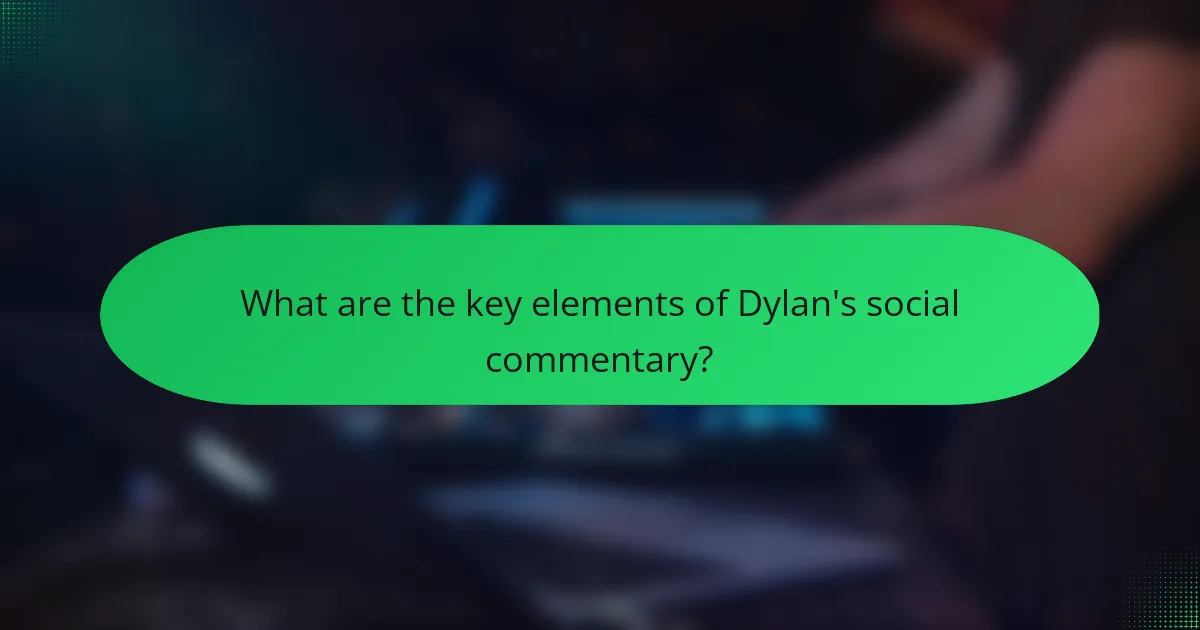
What are the key elements of Dylan’s social commentary?
Dylan’s social commentary encompasses themes of activism, justice, and societal change. His lyrics often critique political systems and social injustices. He addresses issues like civil rights, war, and economic disparity. For instance, “The Times They Are a-Changin'” calls for social revolution. Songs like “Blowin’ in the Wind” pose rhetorical questions about peace and freedom. Dylan’s use of vivid imagery and metaphor enhances his messages. His work reflects the cultural upheaval of the 1960s and beyond. Overall, Dylan’s commentary serves as a powerful voice for marginalized communities.
How does Dylan address civil rights in his lyrics?
Bob Dylan addresses civil rights in his lyrics by highlighting social injustices and advocating for change. His song “Blowin’ in the Wind” poses rhetorical questions about peace, freedom, and equality. This song became an anthem for the civil rights movement in the 1960s. Dylan’s lyrics often reflect the struggles faced by marginalized communities. For example, “The Lonesome Death of Hattie Carroll” tells the story of a Black woman who was unjustly killed. This song critiques systemic racism and the lack of accountability for perpetrators. Dylan’s powerful imagery and poignant storytelling evoke empathy and awareness. His work has inspired generations to engage in activism and social justice.
What specific songs highlight the civil rights movement?
Songs that highlight the civil rights movement include “A Change Is Gonna Come” by Sam Cooke, “The Times They Are a-Changin'” by Bob Dylan, and “We Shall Overcome,” a traditional protest song. “A Change Is Gonna Come” was inspired by Cooke’s experiences with racism and became an anthem for the movement. Bob Dylan’s “The Times They Are a-Changin'” called for social change and unity. “We Shall Overcome” became synonymous with the struggle for civil rights, used in marches and protests. These songs encapsulated the hopes and struggles of the civil rights movement.
How do these songs resonate with contemporary issues?
Bob Dylan’s songs resonate with contemporary issues by addressing social injustices and political unrest. For example, “The Times They Are A-Changin'” reflects the civil rights movement and calls for societal change. Similarly, “Blowin’ in the Wind” poses rhetorical questions about peace and freedom, echoing ongoing struggles for equality. His lyrics often highlight themes of protest and activism relevant to modern movements. The relevance is evident as many contemporary artists cite Dylan’s influence in their own activism. Dylan’s work encourages listeners to engage with pressing social issues, making his music timeless and impactful.
What role does protest play in Dylan’s music?
Protest plays a central role in Bob Dylan’s music. His songs often address social issues and injustices. Dylan’s lyrics serve as a voice for the marginalized and oppressed. For example, “Blowin’ in the Wind” poses rhetorical questions about peace and freedom. The song became an anthem for the civil rights movement. “The Times They Are a-Changin'” calls for societal change and reflects the 1960s counterculture. Dylan’s work often critiques war, poverty, and inequality. His music inspires activism and encourages listeners to reflect on social issues. Dylan’s influence on protest music is significant and enduring.
Which songs serve as anthems for social justice?
“Fight the Power” by Public Enemy serves as a prominent anthem for social justice. This song addresses racial inequality and systemic oppression. It became a rallying cry during the Civil Rights Movement. “Alright” by Kendrick Lamar also symbolizes hope amidst struggles. It highlights resilience in the face of adversity. “Strange Fruit” by Billie Holiday confronts racism and violence against African Americans. This haunting song has historical significance dating back to the 1930s. “The Times They Are a-Changin'” by Bob Dylan calls for social change and activism. It resonates with various movements advocating for justice.
How does Dylan’s approach to protest music differ from others?
Dylan’s approach to protest music is characterized by its blend of personal narrative and broader social themes. Unlike many protest singers, he often incorporates literary and poetic elements into his lyrics. This creates a unique depth that invites multiple interpretations. His songs reflect personal experiences while addressing societal issues, making them relatable on different levels. For instance, “Blowin’ in the Wind” poses rhetorical questions that challenge listeners to think critically about justice and peace. Additionally, Dylan’s use of metaphor and symbolism distinguishes his work from more straightforward protest songs. This complexity allows his music to resonate across generations, maintaining relevance over time.
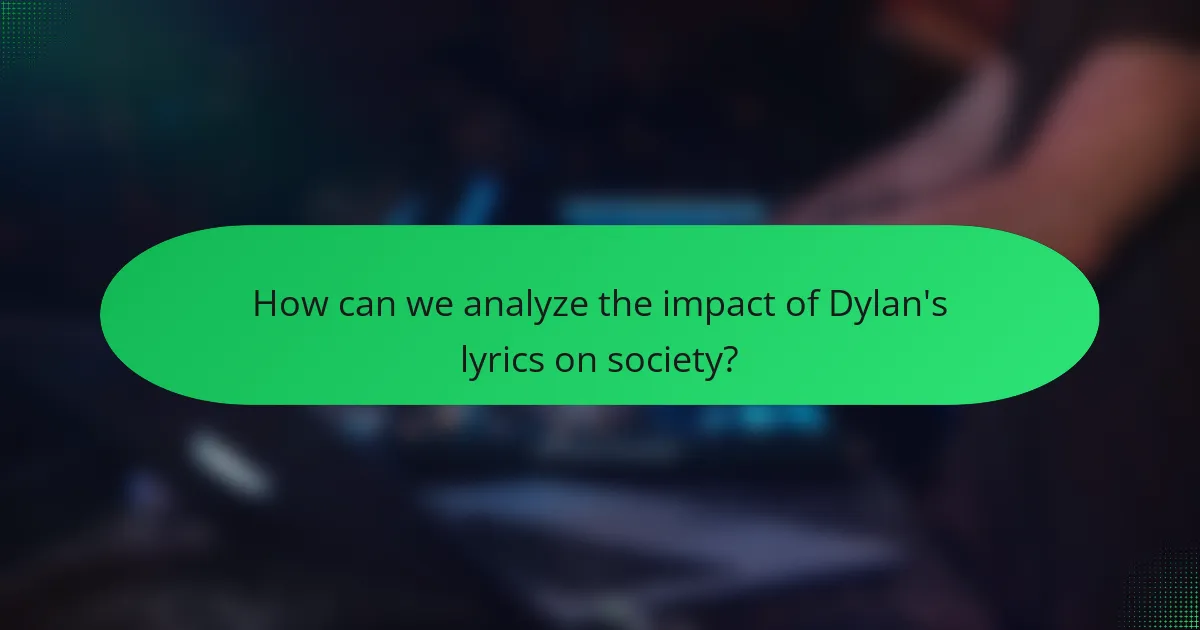
How can we analyze the impact of Dylan’s lyrics on society?
We can analyze the impact of Dylan’s lyrics on society by examining their themes and historical context. Dylan’s songs often address social issues such as civil rights, war, and inequality. For example, “The Times They Are a-Changin'” became an anthem for the 1960s social movements. This song’s lyrics encouraged activism and reflected the desire for change. Additionally, Dylan’s use of vivid imagery and storytelling engages listeners emotionally. Studies show that music can influence public opinion and inspire collective action. Dylan’s work has been cited in numerous academic analyses, highlighting its relevance to social justice. His lyrics have sparked discussions and debates, shaping cultural narratives. Thus, Dylan’s lyrics serve as a powerful tool for social commentary and reflection.
What methodologies can be used to study Dylan’s social commentary?
Qualitative analysis and textual analysis are effective methodologies to study Dylan’s social commentary. Qualitative analysis focuses on understanding themes and meanings in his lyrics. This method allows researchers to interpret the social and political contexts of Dylan’s work. Textual analysis examines the language, structure, and style of his lyrics. This approach helps uncover deeper meanings and rhetorical devices used in his commentary. Historical context is also crucial. Researchers can analyze the socio-political climate during the time of his songwriting. This provides insight into the influences on his social commentary. Additionally, comparative analysis with other artists can highlight unique aspects of Dylan’s approach. These methodologies collectively contribute to a comprehensive understanding of Dylan’s social commentary.
How do literary and musical analysis enhance our understanding?
Literary and musical analysis enhance our understanding by revealing deeper meanings and themes within the works. These analyses dissect language, structure, and cultural context. In Bob Dylan’s lyrics, for example, literary analysis uncovers social commentary on activism and justice. Musical analysis examines how melody and rhythm convey emotions and reinforce messages. Together, they provide insights into the artist’s intent and societal impact. Research shows that analyzing song lyrics can improve critical thinking skills. This approach fosters a greater appreciation for art and its role in social change.
What role does cultural context play in interpreting his work?
Cultural context significantly influences the interpretation of Bob Dylan’s work. His lyrics often reflect the social and political climate of the time. For example, during the 1960s, the civil rights movement and anti-war sentiments permeated his songs. Songs like “Blowin’ in the Wind” address these themes directly, resonating with listeners’ experiences. Understanding the era’s cultural dynamics enhances comprehension of his messages. Additionally, Dylan’s use of folk traditions and historical references provides deeper layers of meaning. This interplay between culture and artistry allows for varied interpretations across different audiences. Cultural context thus serves as a lens through which his work can be understood more profoundly.
What lessons can modern artists learn from Dylan’s approach?
Modern artists can learn the importance of authenticity from Bob Dylan’s approach. Dylan’s lyrics often reflect genuine emotions and societal issues. He addressed topics like civil rights and war, resonating with listeners. This connection fosters a deeper engagement with the audience. Additionally, Dylan’s willingness to evolve musically shows the value of experimentation. He shifted genres while maintaining his core message. This adaptability is crucial for modern artists in a changing landscape. His use of storytelling in songs illustrates the power of narrative. Effective storytelling can enhance the impact of artistic expression. Overall, Dylan’s commitment to social issues and personal truth serves as a guide for contemporary creators.
How can current musicians effectively address social issues in their work?
Current musicians can effectively address social issues by incorporating relevant themes into their lyrics. They can use storytelling to illustrate personal experiences related to social justice. Collaborating with activists can enhance the authenticity of their message. Engaging with their audience through social media amplifies the impact of their work. Musicians can participate in benefit concerts to raise awareness and funds for causes. Historical examples, such as Bob Dylan’s “The Times They Are A-Changin’,” demonstrate the power of music in social movements. Research indicates that music can influence public opinion and inspire action. By addressing social issues, musicians contribute to cultural conversations and promote change.
What are best practices for creating impactful social commentary in music?
To create impactful social commentary in music, artists should focus on authenticity and relevance. Authenticity ensures the message resonates with listeners. Relevant topics reflect current social issues or historical contexts. Artists should employ storytelling techniques to engage audiences emotionally. Vivid imagery and relatable experiences enhance the connection to the message. Collaboration with activists or communities can provide deeper insights and perspectives. Utilizing diverse musical styles can broaden the appeal of the commentary. Finally, clarity in lyrics is crucial for effective communication of the message. These practices have been seen in the works of influential artists like Bob Dylan, whose lyrics address social justice and activism.
Social commentary in Bob Dylan’s song lyrics serves as a critique of social issues, including civil rights, war, and inequality. His use of metaphor and vivid imagery conveys powerful messages that resonate with listeners and reflect societal changes, particularly during the 1960s. Key themes in Dylan’s work include activism, justice, and the call for social change, with songs like “The Times They Are A-Changin'” and “Blowin’ in the Wind” becoming anthems for various movements. The article explores how Dylan’s lyrics address these themes, the historical contexts that influence his songwriting, and the impact of his music on contemporary social issues.
